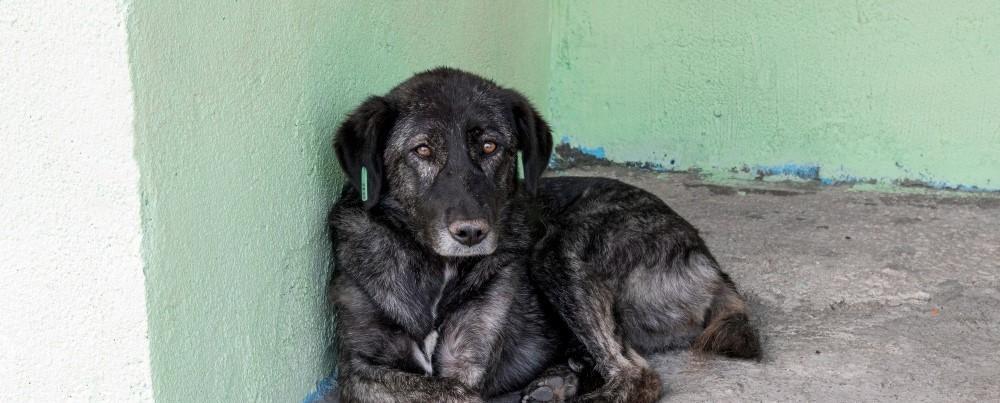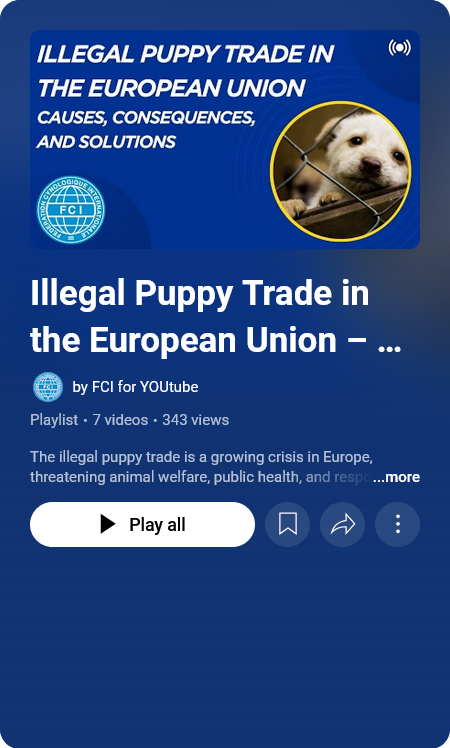
FCI Online conference: ‘Illegal puppy trade in the European Union – Causes, consequences and solutions’
I attended the Fédération Cynologique Internationale (FCI) online conference on the illegal puppy trade on 4 February. The conference program included a slate of expert speakers who addressed various aspects of this important issue.
Educate the buyers – Without demand, there’s no supply
In their opening speeches, Dr. Tamás Jakkel (FCI President) and Jørgen Hindse (President of the FCI European Section) emphasised the need for cooperation between different stakeholders in this area. Dr. Jakkel also emphasised that the two most important steps in dog breeding are: 1) deciding which female and male should produce a litter together, and 2) finding the right homes for the puppies, as puppies in suitable homes rarely end up homeless.
Jørgen Hindse pointed out that only 14% of dogs in the EU are FCI registered pedigree dogs, and yet FCI breeders are most often blamed for animal welfare problems.
Hindse stressed that it is important for the puppy buyer to see the mother and the conditions in which the puppies are reared. This is not possible in puppy mills. He welcomed the new EU law requiring all dogs to have identification and concluded that the key to eliminating puppy mills is to educate puppy buyers. Without demand, there's no supply.
Four Paws calls for three important EU actions
Nick Weston (Head of International Campaigns, FOUR PAWS) gave an overview of the illegal puppy trade in the EU. Among the points he highlighted:
- There is an annual demand for 5.99 million puppies.
- The value of the annual dog trade is 4.6 billion euros.
- 79% of dogs come from unknown or illegal sources.
- 2000 new advertisements for dogs are placed daily on classifieds websites.
- Traceability of sellers is weak.
- In 2021, the EU recognised the illegal puppy trade as organised crime.
These figures are taken from FOUR PAWS's excellent report, 'Billion Euro Industry - Why the EU must strengthen regulations to end the illegal puppy trade now'. The 50-page report includes nine supporting documents. It is the most comprehensive look at the puppy trade currently available.
Weston said no one is safe from illegal puppy traders. Most people don't know about the poor welfare conditions in this business – or they do know, but they want to rescue/save the puppy. It is a perfect business model for the criminals: people will buy anyway. This is high-risk consumer behaviour: people want to buy a puppy NOW, no matter the consequences.
Harmonised legislation is needed to tackle the illegal trade in the EU. FOUR PAWS is calling for three actions:
- Mandatory identification and registration of all dogs and cats
- Classified ad sites to use a registration verification system for puppy ads (Veripet)
- Improved interoperability of databases so that every dog in the EU can be traced throughout its life.
These actions should also be extended to social media groups. Four Paws has met with Meta, which is taking this issue seriously.
What everyone can do:
- Contact the AGRI Committee (via FOUR PAWS: Regulate the EU Puppy Trade Now)
- Raise awareness: inform your members, inform the media
- Encourage your MEPs to vote – dog and cat welfare legislation will be voted on this summer.
Three presentations on welfare issues and health risks
The presentations on welfare issues and health risks included:
- Dr. Gabriella Markus (Veterinarians for Animal Welfare Foundation, The Bojtár Association – Animal Guardian Legal Aid Helpline): Welfare issues and struggles in the “producing” countries,
- Dr. Lilla Balatonyi (clinical veterinarian): Health risks of being born on a puppy farm, and
- Dr. Ágnes Sátori (veterinary behaviourist): Future behavioural problems of puppies coming from illegal trade.
All three presentations were very thought provoking, and they underscored the need to stop the illegal puppy mills immediately…to end all the suffering they cause. In puppy mills, there's no expertise, no genetic testing, no vaccinations/antiparasitics or other treatments, and no love for the animals. And there are also many ‘rescue’ organisations and shelters that are in fact, puppy mills.
Some of the things that stuck in my mind from these three presentations:
-
Suffering of the bitches
- Puppy mill bitches don't know human touch – they are only touched twice a year when they are mated. They have a general fear of people. They don't go for walks, don't get to see and feel the sun, don't hear normal environmental sounds like birds and other animals.
- They must live with constant environmental noise and fear, so their stress levels are high. They have a litter every six months and are abandoned as soon as they are no longer needed.
- The size of the male is not considered in matings, so the puppies are often too large to be born naturally. Signs of botched caesareans and non-veterinary episiotomies are common, and these often kill the mother and sometimes the puppies too.
- Debarking is common, to make the dogs silent.
-
Many health problems from poor nutrition
- Both bitches and puppies are in poor condition due to poor nutrition and environment. As a result, the mother's milk does not contain antibodies against the major pathogens. Puppies have parasites and viral diseases, and because they are not vaccinated even against rabies, they pose a risk to humans. Misuse of antibiotics is wide – to mask infections at the time of sale.
- Poor maternal nutrition leads to impaired foetal gastrointestinal development, which results in puppies having problems absorbing nutrients. Poor nutrition also causes microbiome dysbiosis, which results in chronic diarrhoea and other gastrointestinal problems.
- Poor nutrition causes also underdevelopment of the nervous system and brain biochemistry. This results in defective production of hormones, such as serotonin, so puppies cannot control their emotions, for instance.
-
Behavioural problems and genetic diseases
- Many behavioural problems are the result of poor conditions/nutrition and epigenetic mechanisms.
- In addition, puppies are born with genetic diseases such as hydrocephalus, blindness, deafness, and patellar luxation. This is due to the breeders’ lack of knowledge or ignorance of genetic problems.
-
Puppy mills in Hungary
- Dr Gabriella Markus described the puppy mills in Hungary, where puppy farming has a long tradition. It's considered, by some, better for people to earn money this way than to do nothing and be on welfare.
- The dogs are fed twice a day and that's about all the care they get. The food is of poor quality, unsuitable for dogs and normal puppy development. The primary reason for this poor care is a lack of knowledge.
- There is a licensing system for breeders, but it’s useless for monitoring animal welfare because registering is as easy as opening an account on eBay.
- The police have no money to investigate suspected animal cruelty so that the criminals can be convicted. Only the victims can appeal the cases, but the victim in this case is an animal...
- It is so easy to run an illegal puppy mill in Hungary that people move their business there if they are caught in their own country.
-
Buyers want puppies as young as possible
- Pet shops and buyers want puppies as young as possible. However, the rabies vaccine cannot be given until the puppy is 12 weeks old, so documents are falsified.
- Some veterinarians rubber-stamp vaccination certificates, which puppy mill owners fill in with other information – and the puppy remains unvaccinated. Outbreaks of rabies have occurred in Romania, Poland, and Hungary in recent years, so this is a real threat to humans.
- A new trend to circumvent the rules is to search for 1- to 6-year-old bitches in secret Whatsapp and other social media groups. The bitches are mated and transported pregnant into puppy mills, under non-commercial transport status. The resulting puppies are untraceable.
The objectives of the EU to tackle the illegal dog trade
Lucie Carrouée (DG SANTE, Deputy Head of Unit, Unit G3 – Animal welfare) and Alicja Muznik (Policy officer, DG SANTE, Unit G5 – Food hygiene, feed and fraud) talked about ‘The objectives of the EU to tackle the illegal dog trade’.
Lucie Carrouée and Alicja Muznik work in the Commission's Health and Food Safety department, which is responsible for EU policy on food safety and health and for monitoring the implementation of related legislation. They highlighted several challenges, such as
- Commercial activities disguised as non-commercial
- Falsified vaccination documents
- Animals from Russia and Belarus sold as EU pets to unknown recipients in the EU using Polish, Latvian, and Estonian transporters
- Falsified EU pet passports
- Illegal breeding and import of animals by Romanian associations
The EU is tackling these activities with tools such as direct contact points for the pet trade, regular task force meetings and information exchange, and the involvement of police and prosecutors.
A traceability infrastructure has been planned for the proposed EU legislation on the welfare of dogs and cats, including interoperability between national databases and a verification system for dog and cat advertisements.
Sellers will have to provide specific information in advertisements, such as the sex, date of birth, country of birth, and breed of the animal in question. They will also have to provide the buyer with information on responsible ownership and a link to the verification system where the buyer can check the identification and registration of the puppy.
FCI survey on cultural differences and human tendencies affecting the illegal puppy trade
The last talk was, ‘Cultural differences and human tendencies affecting the illegal puppy trade based on the FCI Survey’, given by Attila Márton (FCI PR Advisor, member of the FCI Health & Welfare Committee). The talk included interesting results of the FCI survey, which will be published soon.
Video recordings of the talks
FCI has begun posting videos of the talks - available here.
My Closing Thoughts – Opportunities for Collaboration
I wholeheartedly agree with Dr. Jakkel on the need for cooperation in ending the illegal puppy trade. And it’s important to note that this issue extends far beyond the EU – into North America and elsewhere around the world.
IPFD and decision-makers from the global dog community have been addressing the issue of supply and demand within a recurring theme at our International Dog Health Workshops (IDHWs). Below are links to related materials from the 5th IDHW, held last year in Helsinki:
I would encourage FCI and FOUR PAWS – and all organisations and leaders who recognise the importance and power of international collaboration – to take part in IPFD’s ongoing discussions and make plans to join us at our 6th IDHW in Bologna, Italy, in the spring of 2026.
We’re always available and ready to discuss collaborative solutions to issues that affect canine health and well-being. We welcome you to connect with us at katariina.maki@ipfdogs.com or info@ipfdogs.com.



Recommended Comments